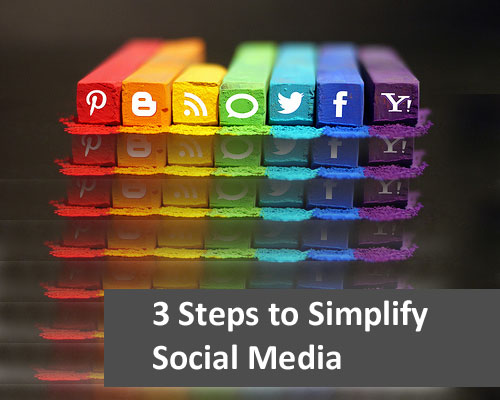Social media is hard! Anyone who tells you differently is probably either part of a particular age group or isn’t trying to apply it to their own small business.
I am part of the technology generation so new technologies, applications, etc. don’t intimidate me. But I still often do not understand what their purpose is or how I should utilize them to their best advantage. If you aren’t careful, you can get caught up spending so much time managing social media that you never actually work on your business. The following three steps will help you sort out social media and develop a manageable social media plan for your business scenario.
Find Your Expert
The biggest issue is that there are so many options out there and they are constantly changing. Whatever was “the” answer yesterday is passe today or worse – non-functional – but then might recover tomorrow. I liken it to the stock market. Unless you really know all the ins and outs (or it is your business), it doesn’t make sense to try and keep up with the new-hot-thing. Although you may “win” sometimes, overall it tends to be an ineffective strategy. However, just like the stock market, if you can find a trusted advisor, you can generally make better decisions.
There are lots of social media experts to be found on the web. So the process of sorting through who is credible and gives useful advice becomes the actual task. Start by getting “referrals” from the folks that you already trust on other subjects. For example, some of the experts I have come to trust are Michael Hyatt (for general social media info), Jon Morrow (for how your blog relates to social media) and Amy Porterfield (for social media specfics – particularly Facebook). You can also find experts by noting who the folks you trust are linking to in their posts, tweets and emails.
Once you think you have found someone, try them on for size. Sign up for their email list, read their posts, follow them on at least one of the social media outlets.
- Does what they say make sense?
- Do you think you can implement what they are describing?
- Do you see results by following their advice?
If you can’t say yes to all of those questions, then it may not be a good fit. But that is okay, there are lots more out there. The trick is to try and limit your experts to just a few. Too many and you will spend all your time trying to keep up (I know this from experience). Too few and you may not have enough options to evaluate which parts will work best for your business.
Pick a Platform (or 2)
Don’t try to be on every type of social media. There are just too many options to do them all, let along do them all well. It’s much better to pick one (possibly two) and use them effectively and efficiently.
So the next question is, how do I pick?
I always believe it is best to start with what feels right or makes the most sense.
- Where are you the most comfortable spending time?
- Where do most of your customers hang out?
- Where will you get the most bang for the time you invest?
If you don’t have answers to any of these questions then start with one and see how it feels, works and produces results. This is not a final decision; you can change it in the future if required. But do give it some time before moving on. Social media does require some momentum. Only in rare cases do folks immediately gain lots of followers or make a big splash. But if it doesn’t feel right, it probably isn’t, so move on and try something else.
Once you find your one (or two) social media outlets, focus your energy on them and don’t jump ship just because something new comes into play. Remember, momentum is critical.
Develop a Strategy
Using the word strategy maybe be overstating what is actually required. Just make a plan. The simpler the plan is, the better. Ultimately the plan only needs a few key elements:
- Time – How much will you devote each day/week? This should be a pretty small number, you have lots of other more valuable work to get done.
- Schedule – Are you posting daily? Multiple times in a day? Using a tool like HootSuite can help give you presence throughout the day without actually being online.
- Content – What type of content are you providing? Linking to other people’s content is a great way to get them to do the same for you! You should also promote yourself, but no one likes the constant sales stream.
Then stick to the plan. Don’t invest more time than you have allocated unless you see a specific business benefit or have developed a special strategy. Social media is more about building relationships and helping people be aware of you so that when you do have a product that they are interested in, they feel confident in buying that product. And if you get sucked into the black hole of social media, you will never have time to create anything that is worth buying.


